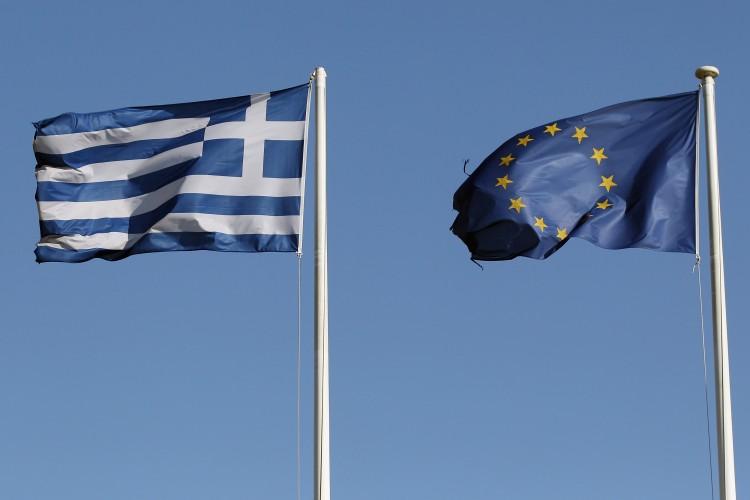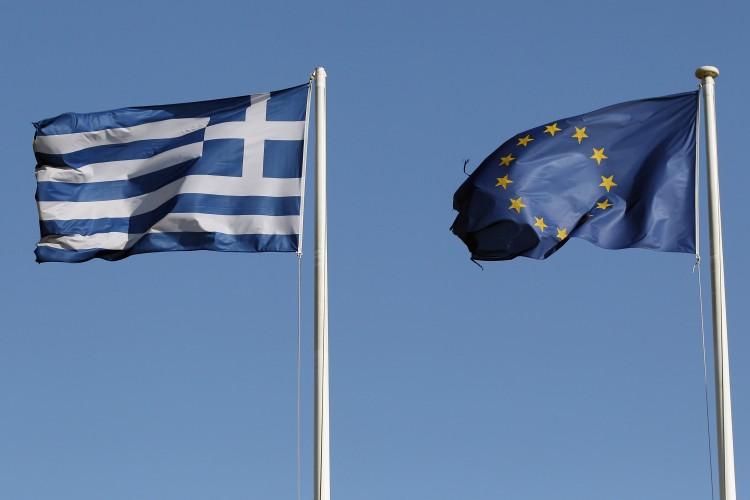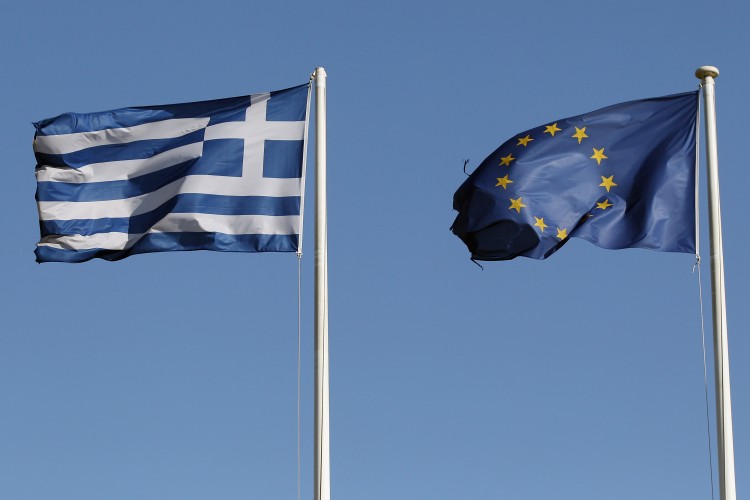AMSTERDAM— European GDP actually surprised on the upside but that number was largely irrelevant in another frantic trading week in Europe.
EU GDP for the fourth quarter of 2011 shrank 0.3 percent as opposed to the 0.4 percent that Bloomberg consensus expected. Instead, Greece took center stage again—GDP there contracted a whopping 7 percent year over year in the fourth quarter and unemployment rose to 20 percent—with negotiations over debt repudiation finally reaching a tentative conclusion last week. This was necessary with the economy on the brink of collapse and the negotiations kept markets busy for the whole of the week.
The euro was in a stable downtrend for most of last week, sliding from a high of $1.33 on Monday to a low of $ 1.30 before recovering and closing at $ 1.32. Equities were slightly more volatile as they rallied to a high of 2,542 points for the EuroStoxx index before sliding to 2,454 last Thursday. Then the market recovered to close at 2,520 last Friday. In between there were five moves of more than 2 percent in different directions, a truly frantic week.
Other markets and the rating agencies were also active. Brent crude rose very close to the all-time high of 93.46 in euro terms, closing the week at 90.91. Apart from record gasoline prices at the pump (est. $8.50 per gallon), these high crude prices generally stifle economic activity. While this is in part due to euro devaluation against the dollar, Iran also had a hand to play by restricting exports to European countries, pre-empting European Union sanctions on Iranian oil that will commence in the summer.
After S&P already took action earlier in January, Moody’s downgraded Italy, Spain, and Portugal and changed the outlook for Austria and France to negative as these countries retained their Aaa rating.
All About Greece
Nonetheless, last week was all about Greece again. After Parliament approved the new austerity measures, an agreement on debt repudiation seems to have been reached between Greece and the Troika. To remind readers, Greece needs to restructure its massive debt load of 182 percent of GDP and negotiations evolve around who needs to pay for what, and how to go about the complex procedure without upsetting fixed income markets too much, or creating bad precedents for other ailing sovereigns.
Headlines were frantic all week and traders had their hands full dodging so called tape-bombs—surprising announcements that are market moving: German Finance Minister Schauble called Greece a “bottomless pit” and said that its “promises are no longer enough.” Shortly after passing the vote in the Greek Parliament, the opposition leader Samaras of the New Democracy Party went on record to announce that he would renegotiate the terms of the new bailout agreement after elections in April.
Jean Claude Juncker, president of the Eurogroup of finance ministers also went on record a few times to complain about missing documents without which the talks could not progress. In between, China was again rumored to be interested in buying Greek and peripheral bonds. All this created the insane volatility in equities, which was reflected in frantic protests that included burnt buildings and cars in Athens.
Deal Reached
While nothing has been inked yet, it is believed that Greece and the Troika have come to an agreement and the markets reacted positive to it. The private sector participation was contingent on this outcome and still needs to be finalized.
On the surface, the deal looks good as it avoids a disorderly default and protects the European Central Bank (ECB) and the European Union (EU) from taking losses. Private creditors will probably accept the 50 percent haircut, which they have already taken on their books and Greece will be relieved of some debt, although exact numbers are not known yet. The insistence of the ECB not to take any losses might have been a pyrrhic victory though.
ECB Holds Special Status
The ECB, which bought between 36billion and 55 billion euros ($47 billion and $72 billion) of Greek bonds outright and holds more as collateral was hellbent on avoiding losses on those bonds. In fact, since the ECB bought at below par, it even has some theoretical profits, if the bonds were held to maturity and Greece could pay back 100 percent of face value.
In the current agreement, the ECB will swap those bonds into new bonds that have the same yield characteristics (i.e. same coupon and maturity) but do not include a collective action clause.
These so called CACs can force a minority of bondholders to agree to what a majority wants to do in a debt restructuring. The ECB will therefore not be forced to agree to anything the private sector does once the CAC triggers. The private sector bonds, however, will be retroactively equipped with a CAC that will go through Parliament most likely next week. This has the purpose of discouraging holdouts that do not want to participate and are speculating that they will receive 100 percent on their bonds at the next payment dates. Those holdouts may still sue against these changes, but the real damage has been done to the structure of the European bond market.
What is The Real Damage?
This procedure effectively subordinates not just Greek bonds—in fact the entirely periphery as this sets the precedent—to the ECB as Bill Gross of PIMCO pointed out on his Twitter feed.
Normally, bonds and loans are priced according to their degree of claims on assets or “seniority.” The highest tier loans are the first to be paid in the event of a bankruptcy and therefore command the lowest risk premium. In a normal capital structure, equity is always the last to be paid and therefore demands the highest risk premium. The ECB will now always be paid before the private sector. On top of that, all Greek bonds are already subordinated to IMF and EU loans, which total 76 billion euros ($99.96 billion) according to Bloomberg.
If virtually all other bonds are now subordinated to ECB bonds and the IMF and EU loans, they will attract substantially lower demand and therefore will demand a much higher risk premium. This means higher yields and higher financing costs for troubled ECB countries.
This is maybe the reason why Bundesbank President Jens Weidman voted against this procedure as yields on the Greek one-year bond peaked at 630 percent. This is a clear reflection that the market is pricing in the new subordination standard and does not believe that losses will be capped at 50 percent.
In addition, by isolating the ECB, the central bank will also be less affected by a direct default, which makes this outcome all the more likely.







